The most convenient method to ensure that your vehicle is well-maintained and in good operating order at all times is to use a specially designed checklist. This checklist must be specific to the type of vehicle you are operating, including your age and make.
Table of Contents
Vehicle Checklist Templates
Ensure the safety and efficiency of your vehicles with our comprehensive collection of Vehicle Checklist Templates. A vehicle checklist is a tool used to inspect and maintain the condition of vehicles, ensuring they meet safety and operational standards. Our customizable and printable templates provide a structured framework for conducting thorough vehicle inspections, covering essential areas such as exterior condition, lights and signals, brakes, tires, engine performance, fluids, and safety equipment.
By utilizing our Vehicle Checklist Templates, you can establish a routine maintenance schedule, identify potential issues early on, and promote a safe driving environment. Whether you’re a fleet manager, vehicle owner, or mechanic, our templates offer a valuable tool to streamline inspection procedures and ensure compliance with regulatory requirements. Simplify the vehicle inspection process, reduce downtime, and enhance the longevity and reliability of your vehicles with our user-friendly templates. Download now and confidently maintain the safety and performance of your vehicles with our Vehicle Checklist Templates.
Benefits of using a vehicle checklist

Your vehicle is a big part of your life. You depend on it to get you to and from work, drive you and your kids around, etc. Having a checklist to establish and maintain a vehicle gives you peace of mind that everything is working properly and safely. Here are the benefits of using a vehicle checklist
It helps in keeping track of all the conditions of your vehicle.
A checklist allows you to keep track of all conditions related to your vehicle. You can mark down any problems that might occur during your trip or after some time. You can also check if there are any missing parts in your car so that they can be replaced or repaired before leaving on a trip.
Allows for easier record-keeping
When you fill out an inspection form for your car, you can easily see what needs to be done next and when it needs to be done. This makes it easy for you to keep track of everything related to your car instead of having several papers scattered around everywhere!
It saves time and money.
A good inspection checklist will allow you to avoid costly repairs by identifying problems before they happen. Some of these problems include worn-out brake pads and a faulty air conditioner. If you know what needs to be fixed, you can take care of them before they cause further damage to your vehicle. This saves both time and money since it prevents unnecessary repairs.
Vehicle Inspection Checklist
In a busy schedule, it’s easy to forget about the most basic maintenance that needs to be done for your car. Car owners should consider a vehicle checklist as part of their vehicle maintenance. A vehicle checkup may seem basic, but it will help avert any potential problems in the future. It will also help you avoid having to pay for more costly repairs due to neglect when the problem could have been fixed with just a simple task such as cleaning the air filter. Here‟s what to include in your checklist:
Your details as the vehicle operator
The first thing that you need to include is your personal details as the owner and operator of the vehicle. This includes your name, address, and other relevant information about yourself. This information helps in case there are any damages caused by your car and you need to file a claim against the insurance company.
Details of your vehicle
The next thing that you need to include is the details of your car, such as its make and model, color, license plate number, engine type, and several cylinders, among others. These details help when it comes to identifying a stolen or impounded vehicle by law enforcement authorities or other agencies who may be involved in such matters.
If you have more than one vehicle, then it’s important to ensure that each has its own checklist so that you can easily track them down in case they get lost or stolen at any time during their lifespan.
Details of the vehicle inspector
The name and contact number of the mechanic inspecting your car is important information you should have before the inspection starts. This way, if there are any concerns or questions regarding the inspection process, you can directly call the inspector and get an answer immediately.
Parts of the vehicle to include in your vehicle checklist
The engine, and other major systems, need to be checked when you are buying a used car. An auto mechanic will run a multipoint drive and check the following parts to get as complete a picture as possible of the health of your car machine:
Tires
Tires play a major role in helping your car move. They also help keep your car safe from road accidents. Therefore, it is very important to check the condition of your tires regularly. You should ensure that they have enough treads on them to provide adequate traction when driving on wet or snowy roads. If they have too few treads, they might not offer enough grip when driving on slippery surfaces. Expert auto mechanics also check if any nails or other sharp objects are embedded into the tires, as this could cause damage to other parts of your car, such as punctured tires or flat tires.
Batteries
The battery is another critical part of your vehicle that needs to be checked regularly. You can tell if there’s something wrong with your battery by looking at how much power it has left in it. If the battery seems weak or if it doesn’t hold a charge very well anymore, it’s time for a replacement!
Tire tread
The tires should have at least 2/32″ of tread depth, which is the minimum required by law in most states. A tire with less than this amount of tread offers poor traction and causes excessive wear on the road surface.
In addition to checking for adequate tread depth, you should also examine the tire for uneven wear or dry rot (caused by exposure to UV light). If you see any signs of damage or wear, it’s time to replace the tires.
Steering and suspension.
To check these systems, get into your local mechanic’s shop and have him or her inspect them for you. If your car has power steering, be sure that it operates smoothly without excessive effort from you; if not, look into getting an inspection done on it as well.
Safety lights
Ensure all safety lights are working properly before you drive off; if not, get them fixed immediately so that other drivers can see you clearly on the road.
Brakes
Make sure they’re working properly by braking gently while driving slowly on a flat surface (e.g., a parking lot) and listening for any squeaking noises or vibration when applying pressure to the pedal; this could indicate worn-out brake pads or shoes).
Engine
The engine is one of the most important parts of any vehicle because it provides power for driving and braking. Mechanics usually check things like oil leaks, coolant leaks, worn belts, and hoses, as well as excessive noise coming from under the hood.
Exterior
Mechanics check things like tires, windshield wipers, and headlights for damage or wear; they also look at other exterior features, such as bumpers and door handles, for signs of damage or wear (or missing parts). All exterior lights should be functional as well (including brake lights).
Exhaust System
The mechanic will also look at the exhaust system to ensure there are no holes in it. This is important because exhaust fumes can be toxic if they are allowed to leak into the car’s cabin.
Belts and Hoses
The auto mechanic looks for signs of wear or damage on each part of the vehicle. For example, he may look for cracks in belts or hoses or worn engine mounts. The mechanic also checks for leaks from any of these parts.
Cooling system (radiator):
Check for leaks and make sure coolant levels are correct. You should also replace any hoses that have already started leaking or show signs of wear and tear (such as cracking).
Windshield wipers:
You may need new ones if they don’t wipe or leave streaks on the glass.
Fluid levels:
Oil, coolant, and brake fluid should be full to their proper level. If any of these fluids are low, they must be topped up immediately.
FAQs
Why is a vehicle checklist important?
A vehicle checklist is important because it helps ensure your car is in safe operating condition and reduces the risk of breakdowns or accidents. Regular inspections identify potential problems early.
How do I create a vehicle maintenance checklist?
Start by listing major systems like tires, brakes, fluids, lights, wipers, etc. Add items specific to your vehicle like transmission, battery, or belt. List when items should be checked, like tires every oil change. Search online templates and customize to your needs.
Can I find free vehicle checklist templates online?
Yes, many free vehicle maintenance checklist templates are available online. Search for “free vehicle inspection checklist template” to find PDF, Word, and Excel templates that can be downloaded, customized, and printed.
What should be included in a daily vehicle inspection checklist?
A daily checklist should include fluid levels, tires, lights, windshield, and checking for leaks. Make sure headlights, brake lights, turn signals all work. Check tire pressure and tread depth. Look under the car for any puddles.
Are there vehicle checklist apps available for smartphones?
Yes, there are many free apps like MyCar Inspection, Drivvo, and Car Maintenance Reminder that provide digital vehicle checklists and maintenance schedules. These let you track service on your phone and get reminders for upcoming maintenance.
How often should I complete a vehicle checklist?
It’s recommended to do a basic vehicle checklist at least once a month. Check fluids, tires, lights, etc. Do a more thorough inspection at oil changes or every 6 months. High mileage or older vehicles may need more frequent inspections.
Is a vehicle checklist required by law?
There is no federal law requiring private vehicle owners to complete checklists. Some states require commercial trucks and fleet vehicles to maintain detailed inspection reports. Most manufacturers provide maintenance checklists in owner’s manuals.
What’s the difference between a vehicle checklist and a vehicle inspection report?
A checklist is a short list of items to inspect. An inspection report is a detailed formal document noting the condition of all systems and components. Inspection reports are required for commercial vehicles and often done when buying/selling used cars.
How do vehicle checklists improve safety?
Checklists help find issues like bald tires, bad brakes, or faulty lights. Fixing these prevents breakdowns or accidents. Routine maintenance also improves overall vehicle roadworthiness. Checklists promote good service habits.






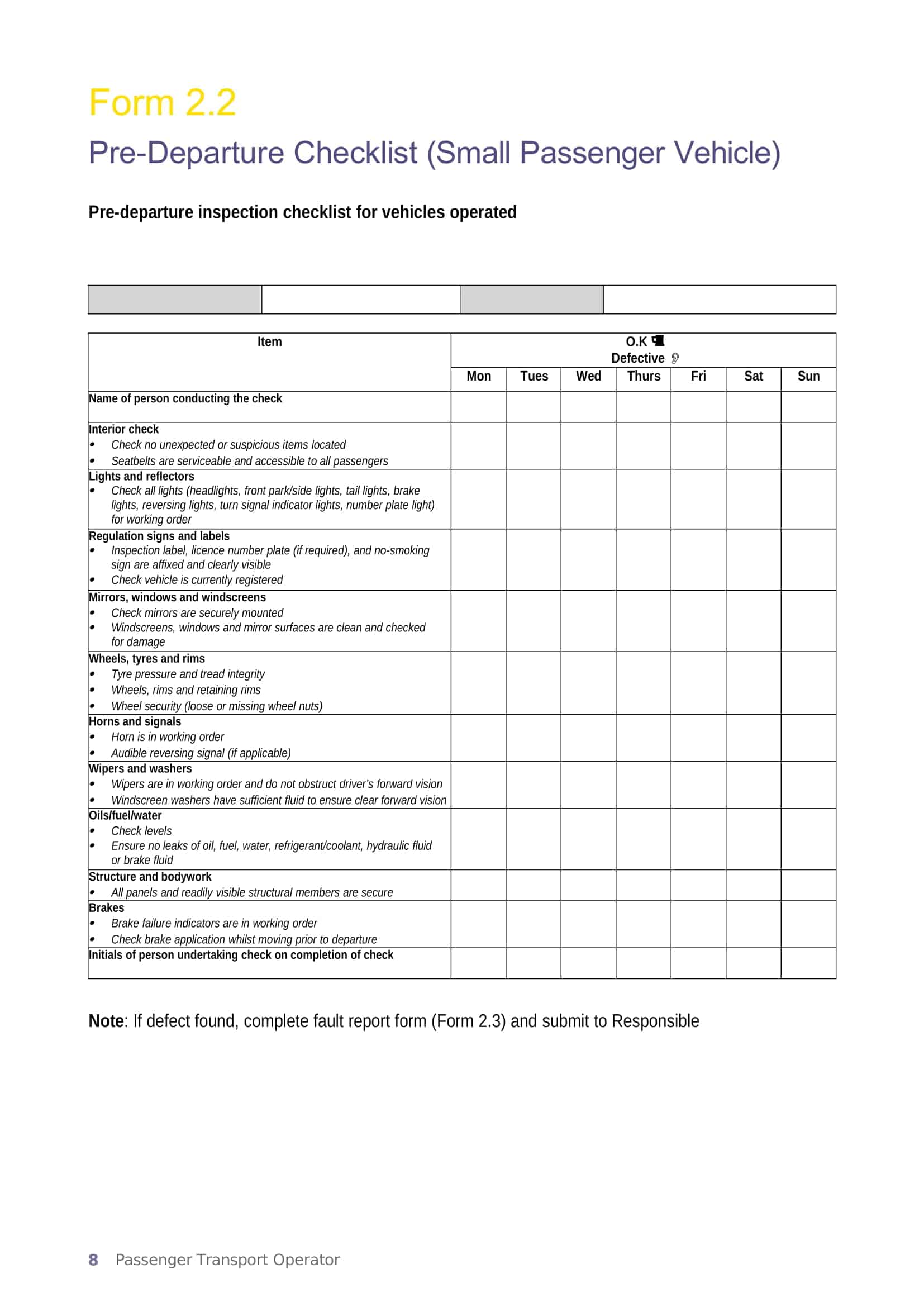





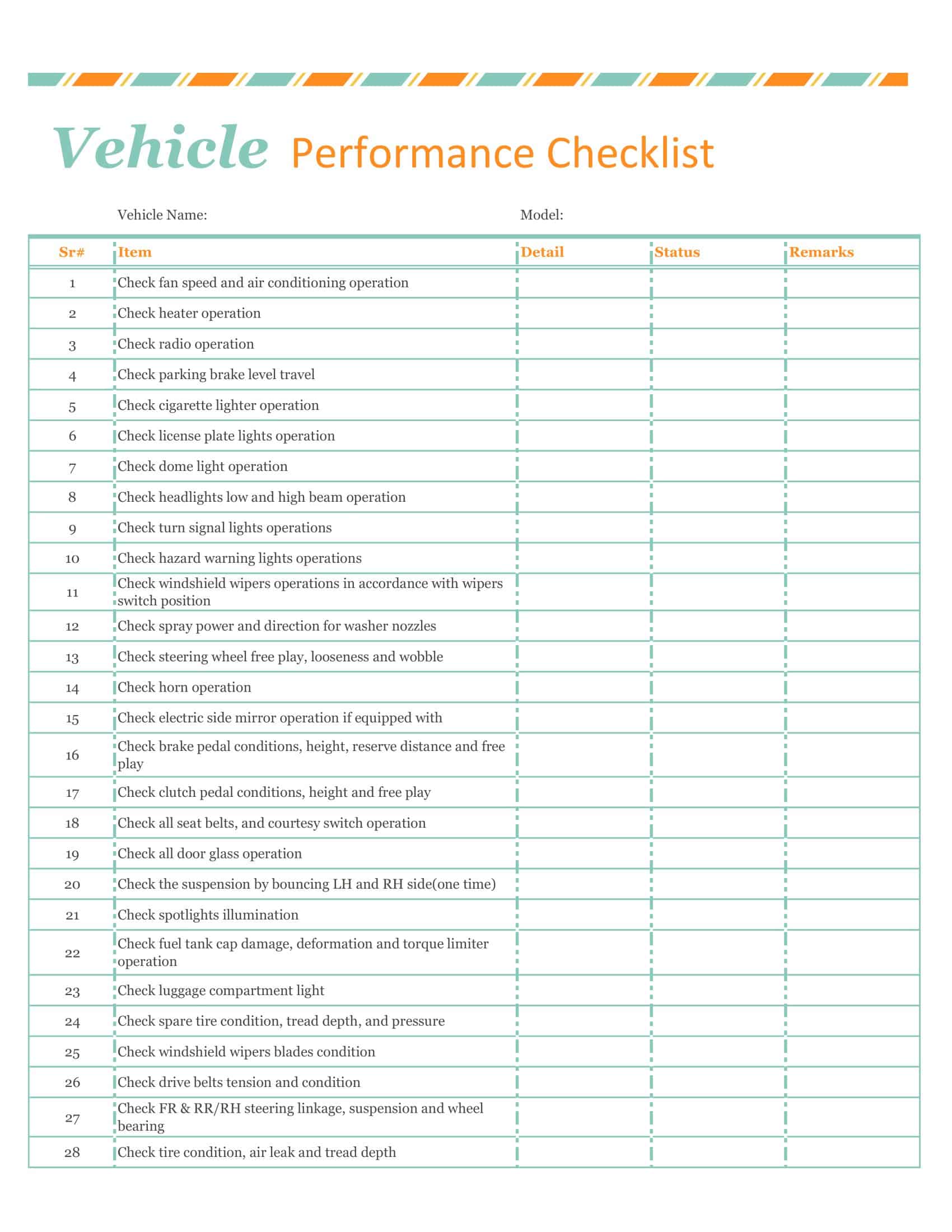



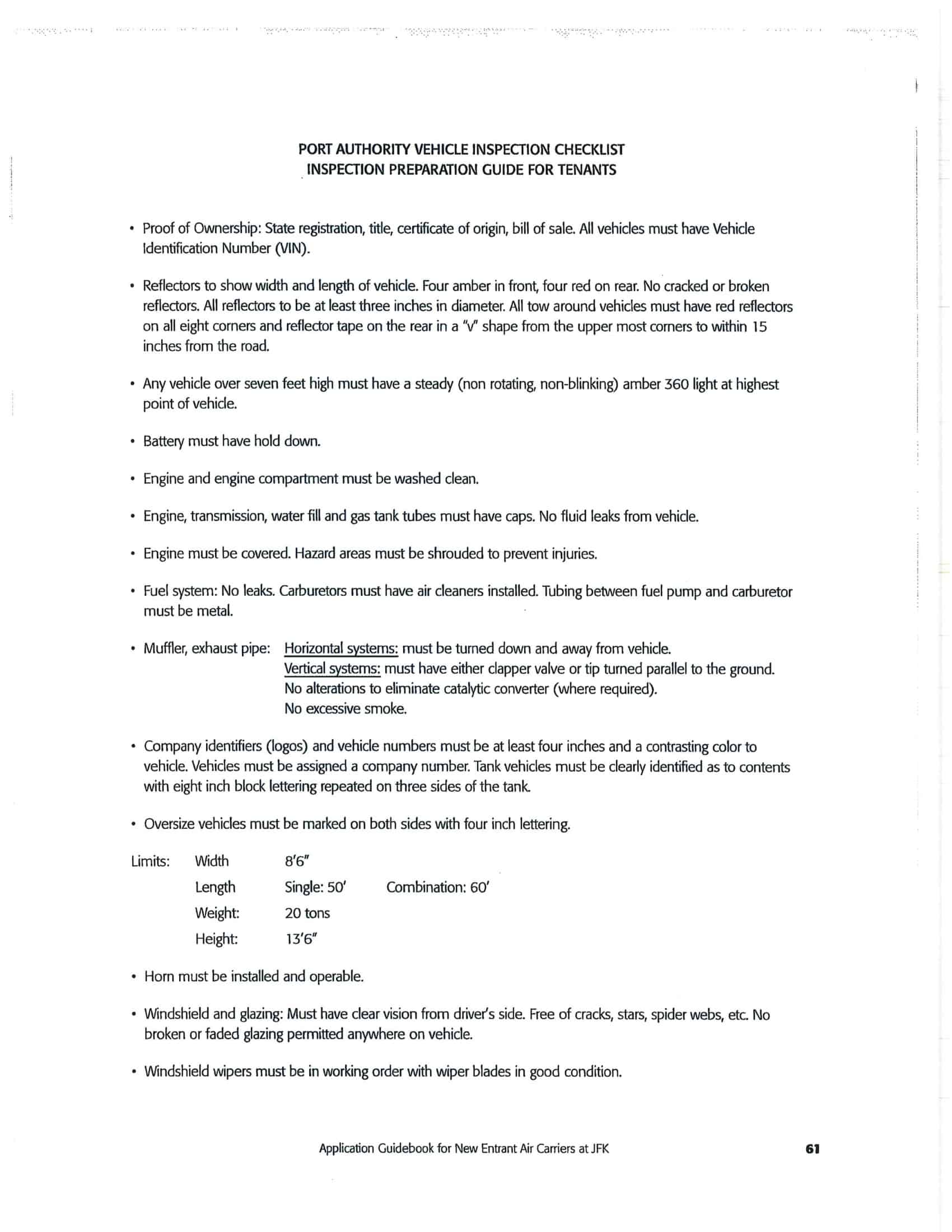

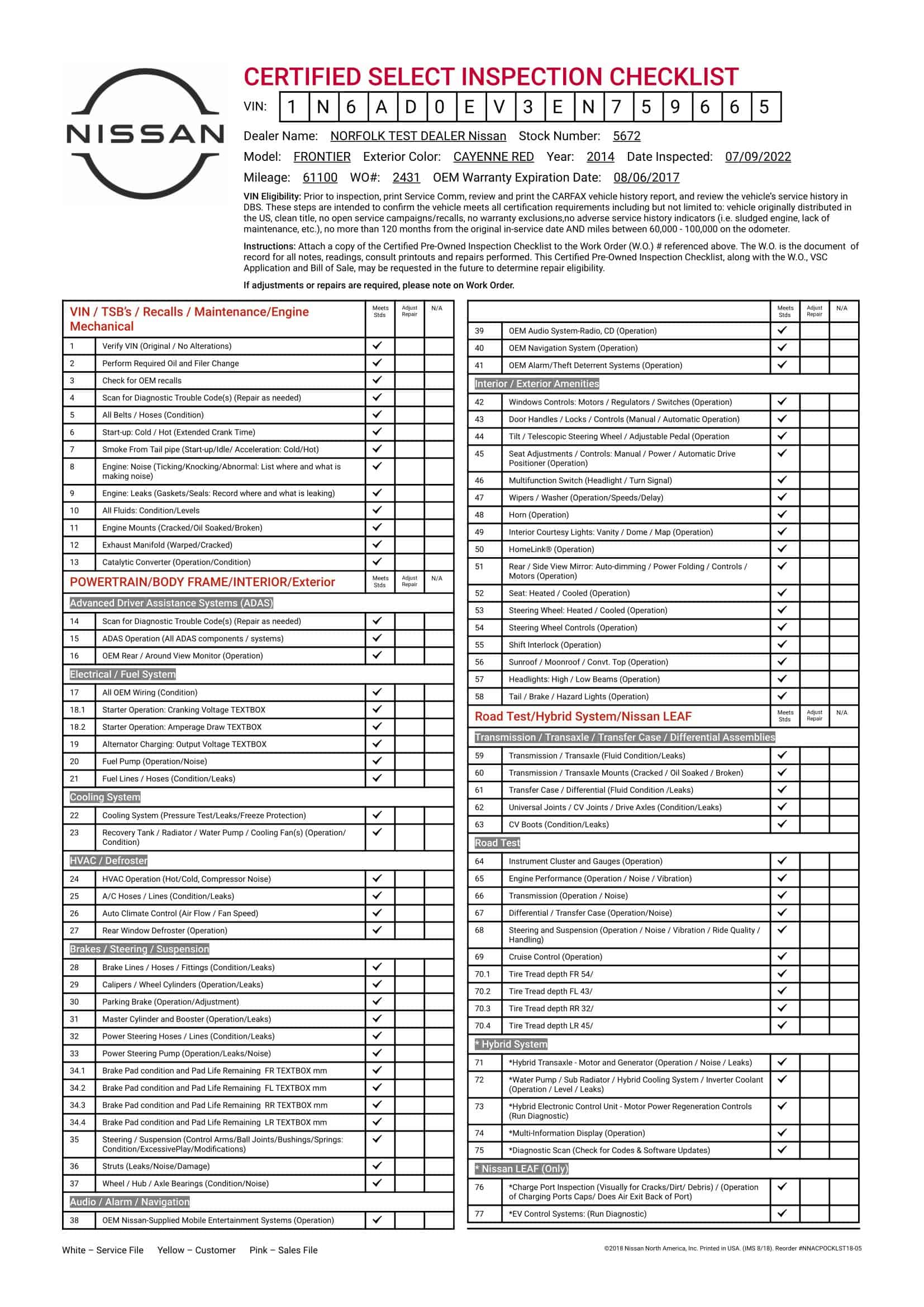



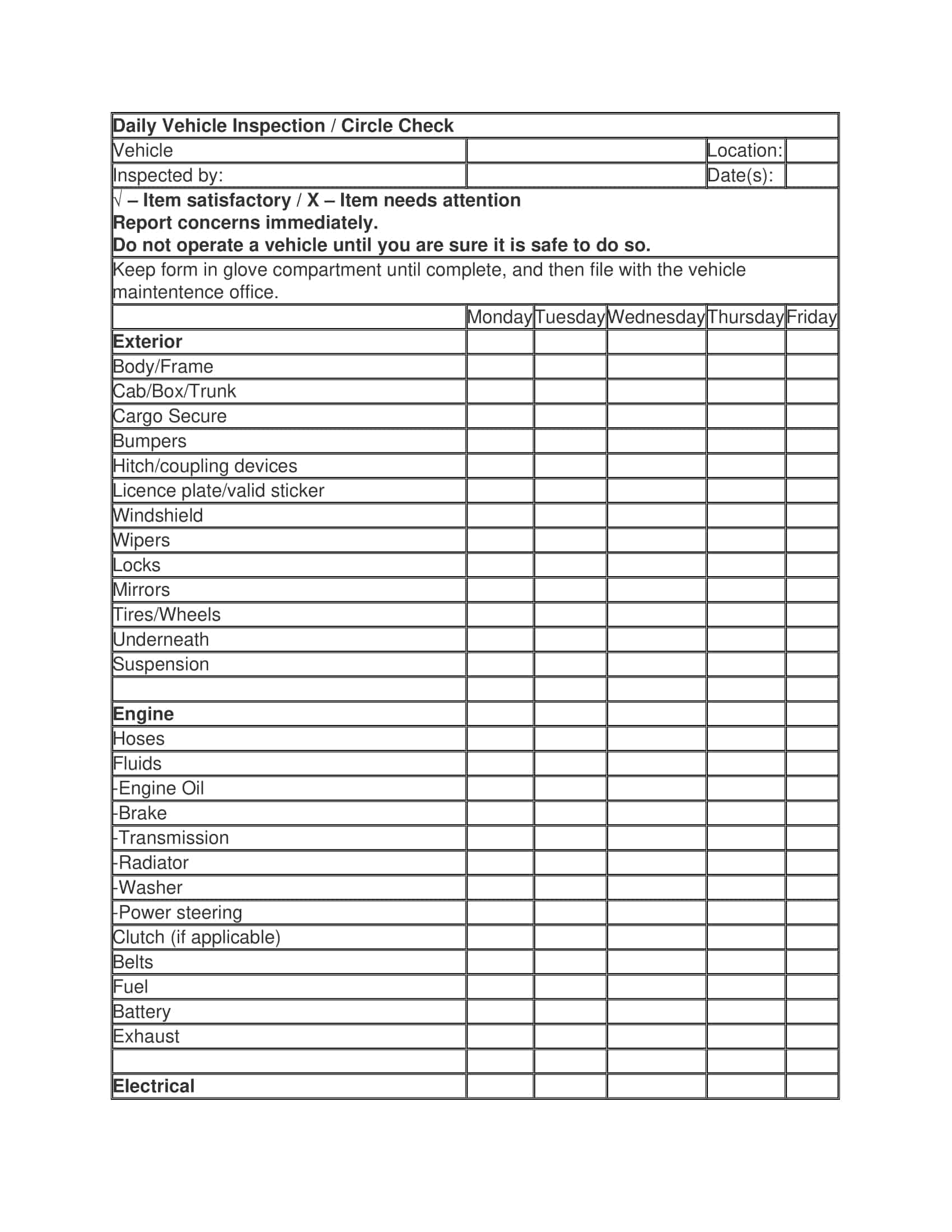














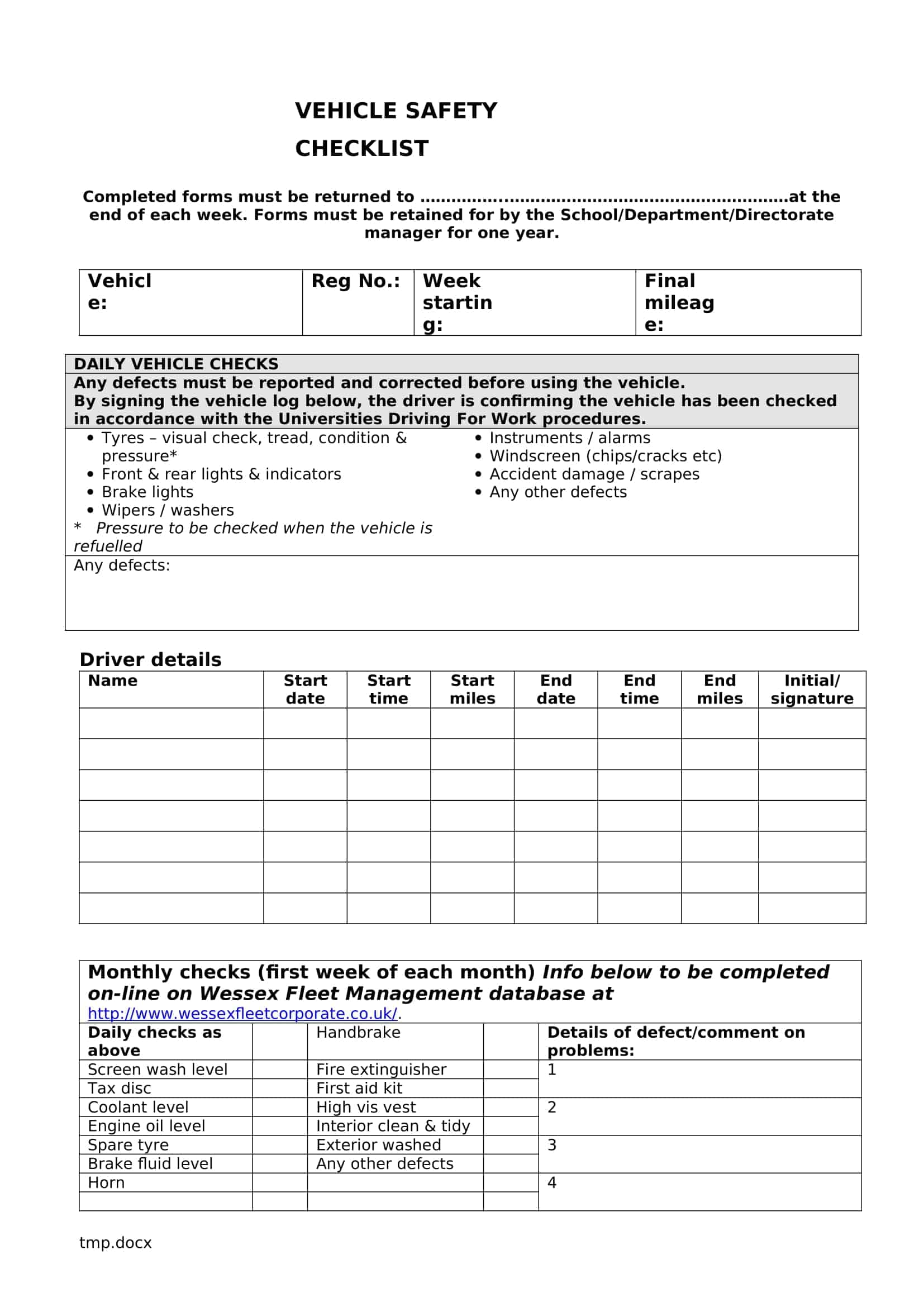











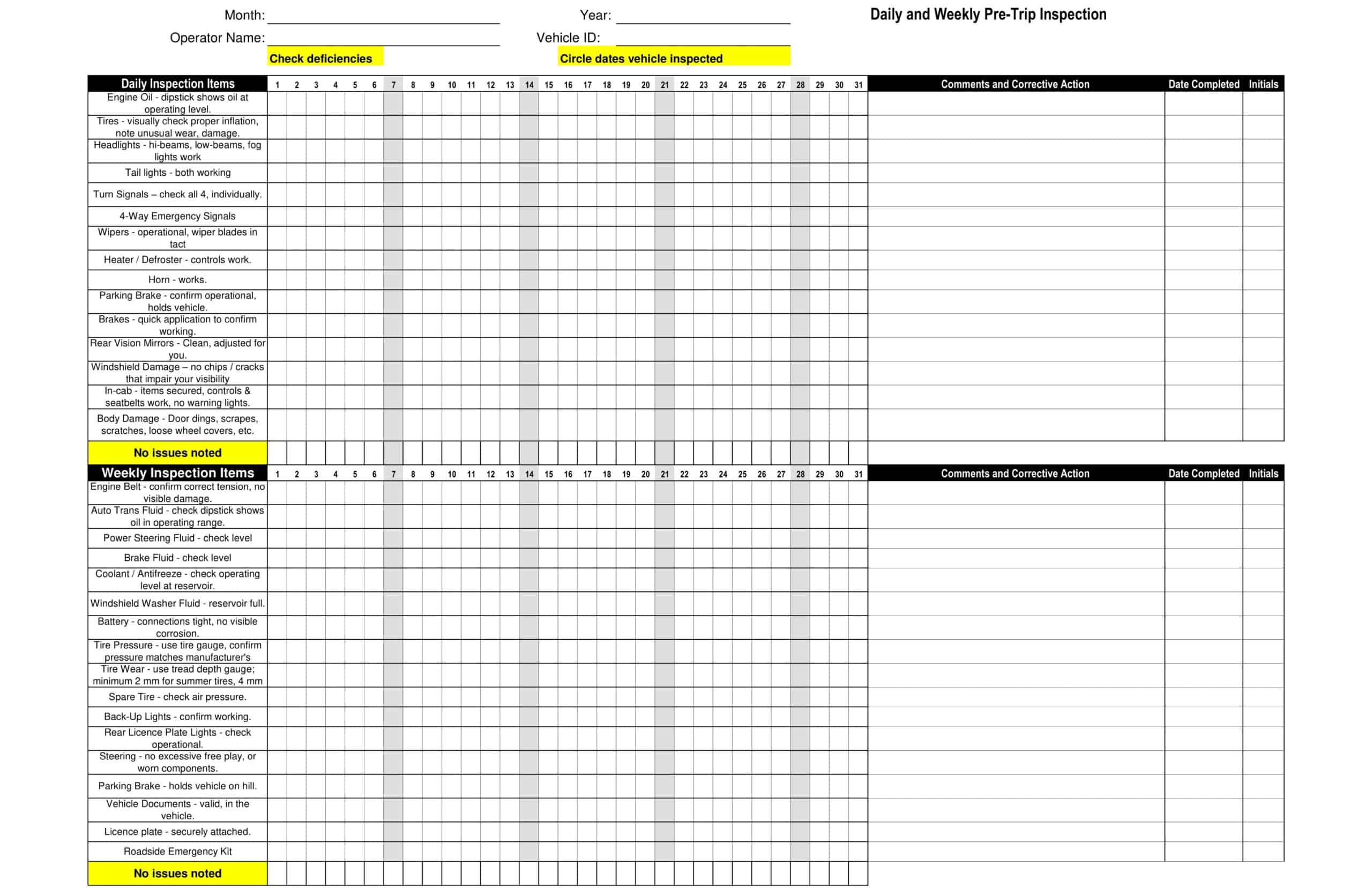
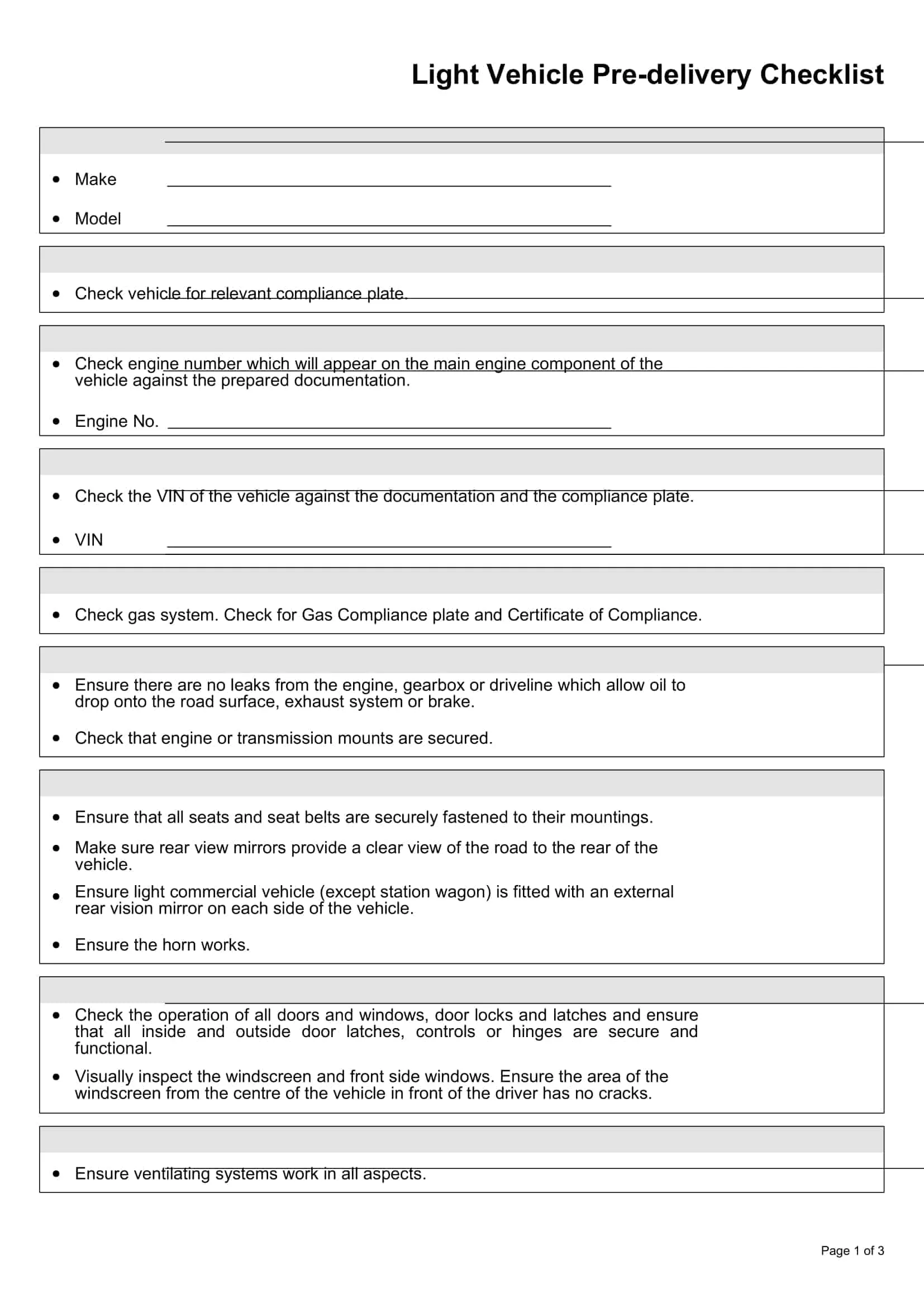
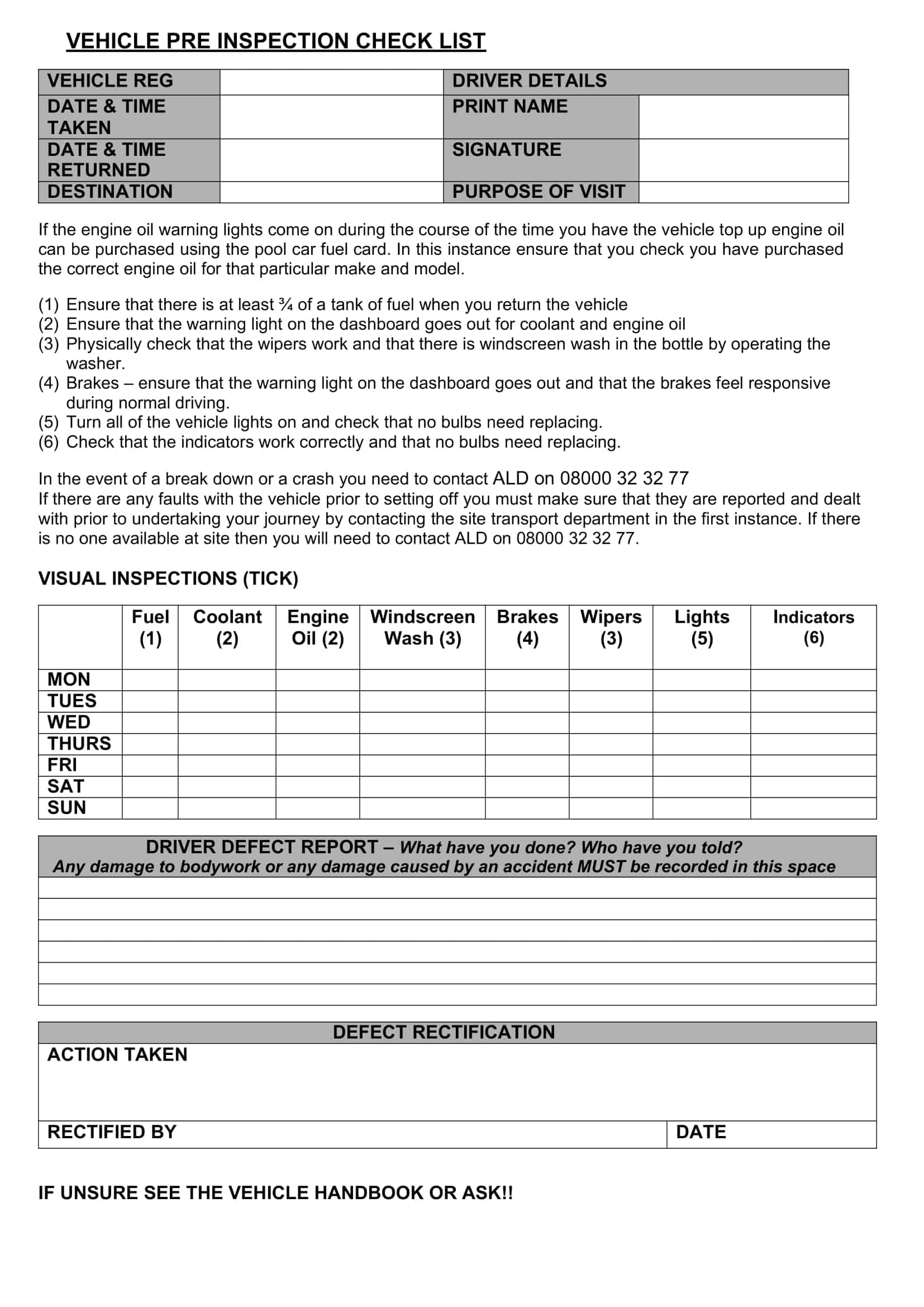
![Free Printable Credit Card Authorization Form Templates [PDF, Word, Excel] 1 Credit Card Authorization Form](https://www.typecalendar.com/wp-content/uploads/2023/06/Credit-Card-Authorization-Form-150x150.jpg)
![Free Printable Stock Ledger Templates [Excel,PDF, Word] 2 Stock Ledger](https://www.typecalendar.com/wp-content/uploads/2023/08/Stock-Ledger-150x150.jpg)
![Free Printable Financial Projections Templates [Excel, PDF] 3 Financial Projection](https://www.typecalendar.com/wp-content/uploads/2023/05/Financial-Projection-1-150x150.jpg)
